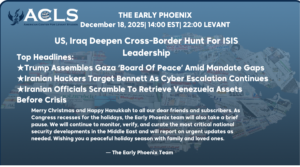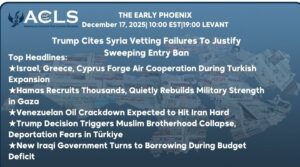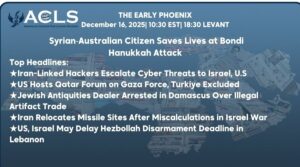The Early Phoenix
December 15, 2023
Top 5 Headlines:
- The New Phase of IDF Operations in Gaza.
- Iranian Hackers Strike Again: Advanced Cyberattacks on Israeli Targets.
- Lebanon Extends Term of Army Chief by One Year at U.S. Urging.
- Iraqi Government Ability to Protect Foreign Delegations in Doubt.
- Congress Cuts Funding for Syrian Democratic Forces Despite Escalating Threats.
======================
★ ISRAEL & PALESTINIAN TERRITORIES
- Europe Cracks Down on Hamas-Linked Terror Plots.
German and Danish authorities have arrested several individuals suspected of belonging to Hamas, a group recognized by the EU and the US as a terrorist organization. In Germany, four suspects were detained for allegedly planning attacks on Jewish institutions in Europe, with three arrests in Berlin and one in the Netherlands. These suspects, reportedly long-time members of Hamas, were tasked with acquiring weapons for potential attacks. Meanwhile, Danish security services arrested seven individuals linked to Hamas, thwarting a planned terrorist attack.
======================
★ LEBANON
- U.S. Ambassador Spearheads Stability in Lebanon. Following the approval of a law proposal to extend the tenure of army and security service commander, Joseph Aoun in Lebanon for a year, U.S. Ambassador Dorothy Shea spearheaded diplomatic efforts to bolster Lebanese security. Collaborating with British and Canadian ambassadors, Shea focused on enhancing border security with Syria and maintaining peace along the Blue Line. Her role was instrumental in supporting the extension of General Aoun’s tenure, emphasizing the U.S.’s commitment to Lebanon’s institutional stability and regional peace initiatives. France’s Foreign Minister, Catherine Colonna, also visited Lebanon to address wider regional conflicts, urging restraint along the Israeli-Lebanese border and diplomatic efforts for the release of French hostages.
- Tensions Escalate on Israeli-Lebanese Borders. Recently, Israel dropped warning leaflets in Kfar Shuba, near Shebaa Farms, cautioning against Hezbollah’s presence. This action follows a series of cross-border hostilities, including Israeli shelling near Houla and Mays al-Jabal. The escalation, linked to Hezbollah’s operations against Israeli targets and Israel’s retaliatory bombings, has led to significant casualties and destruction in border areas. This situation marks a severe increase in conflict since the 2006 war between Israel and Hezbollah.
======================
★ IRAN
- Iranian Hackers Strike Again: Advanced Cyberattacks on Israeli Targets. The Iranian hacker group OilRig, also known as APT34, has ramped up its cyber offensive against Israel. Utilizing newly developed malware, they have infiltrated Israeli healthcare, manufacturing, and government sectors. These sophisticated attacks, identified by cybersecurity firm ESET, are conducted through cloud service providers, making them hard to trace. Active since 2014, OilRig initially targeted Middle Eastern entities in finance, energy, and telecommunications. However, their operations have now expanded globally, focusing on organizations linked to Israel. A notable attack disrupted an Irish water facility using Israeli technology, highlighting the increasing threat posed by these Iranian hackers to Israeli security and interests on a global scale.
- Iran Ranks Third in Oil Production Among OPEC Countries Despite U.S. Sanctions. Despite facing U.S. sanctions, Iran holds the third position in oil production within OPEC, as per the latest report. The country’s output rose to 3.128 million barrels per day in November 2023. This increase, surpassing 7,000 barrels from the previous month, marks a significant climb from fourth to third place, overtaking the UAE. Leading the list are Saudi Arabia with 8.998 million barrels per day and Iraq with 4.278 million, while the UAE and Kuwait follow Iran in the rankings.
- Shiite Clerics’ Stance Against the U.S. and Sunni Militants’ Response in Iran. Senior Shiite clerics in Iran, exemplified by Ayatollah Ahmad Alamolhoda, have declared opposition to the U.S. as a religious duty, advocating for cutting ties with Western countries. This stance is part of a broader shift towards strengthening ties with Eastern powers like Russia and China, as seen in Iran’s support for Russia in the Ukraine conflict. In contrast, Sunni militants, particularly Jaish al-Adl, are actively opposing Iran’s Shiite clerical rule through armed attacks, such as the recent assault on a police station in Rask, which resulted in numerous casualties. This militant response highlights the deepening sectarian divide and the Sunni community’s push for greater rights and better living conditions in regions like Sistan-Baluchistan Province.
======================
★ IRAQ
- Is Iraq Capable of Protecting Foreign Delegations? Questions arise about the Iraqi government’s effectiveness in safeguarding international delegations, especially U.S. forces. The government’s arrest of individuals linked to the U.S. Embassy attack in Baghdad, some of whom are connected to Iraqi security agencies, highlights ongoing concerns about internal threats. Further complicating matters is the Iraqi Islamic Resistance’s drone strike on Ain al-Asad Air Base in Anbar Province, a direct response to Israeli actions in Gaza, targeting the U.S. military. The recent surge in attacks, including 86 drone and missile strikes on U.S. bases in Iraq and Syria since October, emphasizes the escalating security risks for U.S. forces and the Iraqi government’s challenge in ensuring the safety of international delegations. In a related development, the Biden administration last month renewed exemptions from sanctions on Iran, permitting Iraq to continue purchasing electricity from Iran. The funds, earmarked for humanitarian transactions, are held in an Omani account. Elizabeth Rosenberg, Treasury Assistant Secretary, noted that Iran has accessed these funds twice since the exemption. This financial mechanism is crucial for Iraq, which lacks alternative power sources; discontinuing it could destabilize this key American ally.
======================
★ SYRIA
- Why Cut Syria’s Defense Budget Despite Rising Attacks on U.S. Forces? In a decision that warrants scrutiny, the U.S. House of Representatives has approved a notable reduction in Syria’s defense funding. This $9 million cut, part of the $886 billion defense budget for fiscal year 2024, comes at a time of escalating attacks on U.S. forces by Iranian militias and ISIS militants. The reduction, which affects the Syrian Democratic Forces, raises questions about its timing and implications, especially considering the intensified militant activities in the region. This includes drone attacks by the “Islamic Resistance in Iraq” on the U.S. Al-Shaddadi base and ISIS’s assaults in Deir ez-Zor, which have heightened tensions and resulted in numerous casualties. The decision to decrease funding amidst these developments presents a significant point of discussion regarding U.S. strategic priorities in the region.
- U.S. Defense Budget Cuts in Syria Coincide with Russia’s Strengthened Military Presence. Russian President Vladimir Putin has reaffirmed Russia’s ongoing military presence in Syria, a strategic move to protect vital interests and reject any withdrawal plans. This commitment is marked by the adaptability of Russian forces, operating as flexible “points” rather than permanent bases, while maintaining adherence to international obligations. Concurrently, the Syrian regime has expanded its diplomatic reach by opening an honorary consulate in Bratislava, Slovakia. This development is notable as it occurs despite Slovakia’s membership in the EU and NATO, and in the context of the EU’s stance against normalizing relations with the Syrian regime. The EU continues to advocate for a political transition in Syria, aligning with the principles of UN Security Council Resolution 2254.
======================
★ THE GULF REGION & YEMEN
- Saudi Arabia Advances: Economic Growth, Diplomatic Power, and Regional Integration. Saudi Arabia is making significant strides in various domains, including economic diversification, diplomatic relations, and regional cooperation. The IMF has encouraged Gulf states, including Saudi Arabia, to continue developing their non-oil sectors, which are vital for regional economic growth. This advice aligns with Saudi efforts to reduce reliance on oil, aiming to decrease the non-oil fiscal deficit to 24% of GDP by 2028. Politically, Saudi Foreign Minister Prince Faisal bin Farhan’s discussions with British counterpart David Cameron on Gaza underscore the Kingdom’s active role in international diplomacy and crisis resolution. Regionally, Saudi Arabia is enhancing its connectivity and cultural exchange, evidenced by Iran’s unilateral waiver of visa requirements for Saudi citizens and the inauguration of the “Tasheel” Saudi visa services center in Turkey. This center is designed to facilitate travel and strengthen bilateral ties. Additionally, Saudi Arabia’s security cooperation plan with Italy reflects its commitment to enhancing international security partnerships. These developments collectively illustrate Saudi Arabia’s progress in economic diversification, diplomatic engagement, and regional collaboration.
======================
★ EGYPT & AFRICA
- US Commander General Kurella’s Active Role in Addressing Middle East Security Concerns. Lieutenant General Michael Eric Kurella, the Commander of the US Central Command (Centcom), has been actively engaged in the Middle East, as evidenced by his recent visits to Egypt and Jordan. During his time in Egypt, General Kurella met with Lieutenant General Osama Askar, the Chief of Staff of the Egyptian Armed Forces. In Jordan, he held discussions with Major General Yousef Ahmed Al-Hunaiti, the Chairman of the Jordanian Joint Chiefs of Staff, and his team. These meetings focused on addressing current security issues within the US Central Command’s area of responsibility. General Kurella’s visits, including a trip to the Rafah border crossing in North Sinai last June, underscore his involvement in understanding and addressing the security concerns of key regional partners, offering him insights into the region from the perspective of these allies. Concurrently, both Egypt and Jordan have expressed grave concerns over an alleged Israeli controversial plan to evacuate Gaza residents to neighboring countries.
- Efforts to Enhance Security and Stability in South Sudan: A Comprehensive Approach. UAE’s Amira Al-Hafiti Urges Comprehensive Strategy for Sudan’s Stability. Highlighting the need to tackle violence’s root causes and promote peace, Al-Hafiti calls for strengthened security and societal structures in Sudan. She commends the UNMISS mission’s role in civilian protection and reconciliation, and stresses the importance of women’s involvement in elections and societal development, amid Sudan’s complex humanitarian challenges.
======================
★ TURKIYE
- Turkey’s Groundbreaking Move in Energy: Major Oil and Natural Gas Initiative. Turkey, making significant strides in energy resources, announces a pioneering step in oil and natural gas exploration and production. Minister of Energy and Natural Resources Alparslan Bayraktar highlighted the achievements, emphasizing the importance of mining and energy sectors in the economy. The country aims to strengthen energy security with increased domestic and international oil and gas exploration. Bayraktar also highlighted Turkey’s accomplishments in natural gas accessibility, reaching 83% of the population.
======================
📌 Incase you missed it,
📰 THE EARLY PHOENIX December 14, 2023
📰 THE EARLY PHOENIX December 13, 2023
📰 THE EARLY PHOENIX December 12, 2023
🌍 The Region December 11, 2023
🌍 Israel
🌍 Iran
🌍 Turkiye
🌍 SYRIA
✒️ Listen to the Voice of the People Latest:
🔗 After October 7, is Jordan in Tehran’s Crosshairs?
🔗 Follow the latest news from the American Center for Levant Studies via Google News



